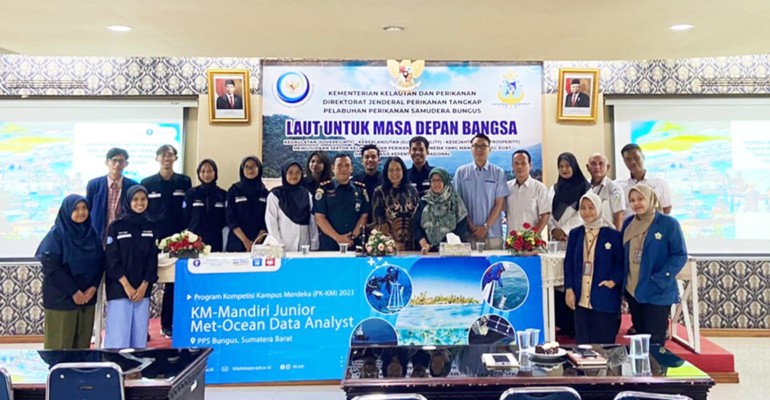Declining Catches, IPB University Students Detect Fishing Areas in Bungus Waters, West Sumatra

IPB University students took part in the Mandiri Junior Met-Ocean Data Analyst Independent Campus Competition Program (PKKM). The program held by the Department of Marine Science and Technology (ITK), Faculty of Fisheries and Marine Sciences (FPIK) is in 6 locations, namely Pramuka Island, Lancang Island, Brebes, Bungus, Pelabuhan Ratu and Tolitoli.
Specifically in Bungus, IPB University students participating in the PKKM, consisting of seven people, focused on studying the condition of fishing areas at the Bungus Ocean Fisheries Port (PPS), West Sumatra. One of them is to answer the problem of the decline in fish catches that has occurred in recent months.
During the activity, participants interviewed local fishermen and PPS officers. They also made visits and requested data from the Bayur Bay Meteorology, Climatology and Geophysics Agency (BMKG), the Coastal Resources and Vulnerability Research Center (LRSDKP) and PPS Bungus.
Apart from that, IPB University students also collected acoustic data in Bungus Bay and installed a maritime weather monitoring device or Automatic Weather Station (AWS) at BMKG Teluk Bayur.
“We really welcome IPB University students. “Hopefully the research carried out can find a solution to the problem in Bungus, namely a decrease in catches, especially tuna boats because Bagan boats actually catch more,” said Yulian Toni, SStPi as Sub-Coordinator of PPS Bungus Harbormaster.
The results of interviews by IPB University students with fishermen and Bungus PPS officers showed that there had been a decline in fish catches over the past two months.
“Indeed, it has been two months since the fishing boats have been docked, so there has been no ship unloading activity at PPS Bungus. “Maybe it’s due to weather factors or water temperature,” explained Ir Suhadi, MSi, OPK PPS Bungus Coordinator.
This statement was supported by an explanation from one of the fishermen. “Most of the ships that dock are tuna boats, the fishing locations are in the Mentawai and Natuna Islands but they haven’t gone to sea for two months because there are no fish. “If conditions are famine, no fishing is carried out and it remains at the pier,” explained Eka.
In this internship activity, the interns collected acoustic data using a Simrad EK-15 tool. This effort aims to obtain target strength (TS) and scattering volume (SV) which are used to detect target groups such as schools of fish in the water column.
Apart from that, water quality data was processed by mapping the distribution of chlorophyll and temperature in August and September using ocean-color satellite image data.
The data obtained was then processed and presented in a focus group discussion (FGD) which was attended by 20 people including two ITK IPB University lecturers (Prof Sri Pujiyati and Dr Steven Solikin), representatives of PPS Bungus staff, as well as students from Bengkulu University and Jambi University.
“From several studies, in Bungus Waters, there is a shift in the thermal front so that the fishing location moves and upwelling also does not appear. “If there is upwelling, there will be more nutrients, but it takes time because it takes fish to grow and is related to the food chain in the sea,” said Prof Sri Pujiyati.
“In the future, fishermen can be informed that in certain months tuna fish decreases, while certain fish are abundant (from the Bagan boats) so that fishermen do not stop their activities because they can look for other types of fish,” she continued. (DHAA/Rz) (IAAS/Res)



